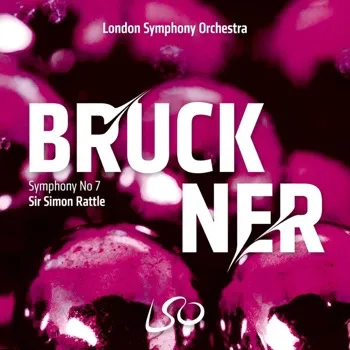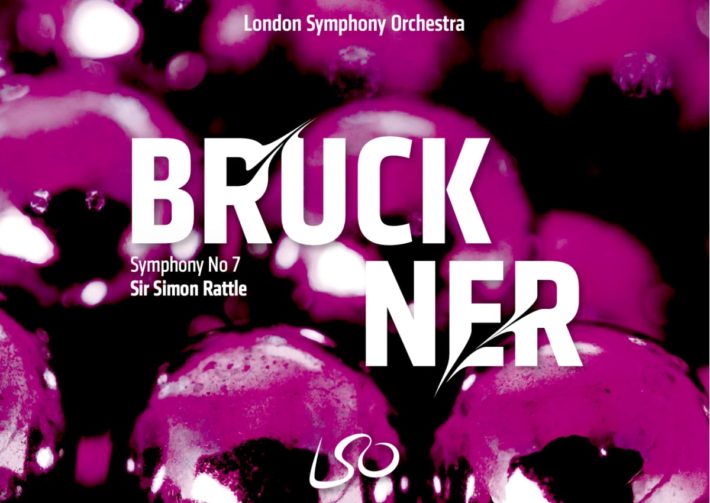Simon Rattle leisurely exploration of Bruckner symphonies continues, with audio performances of the fourth and sixth, a video of the eighth and this new album of the seventh. The three audio releases offer premiere recordings of editions by Benjamin-Gunnar Cohrs, Editor in Chief of the Anton Bruckner Edition Wien. Rattle is apparently the current patron conductor of the series (Nikolaus Harnoncourt was the first). As any lover of Bruckner knows, there are numerous editions for most of the symphonies, and one might justifiably question the need for another. Cohrs addresses this in the liner notes, though for greater insight into his reasoning and efforts, it’s worth searching for his recent interviews.

This has proven to be a difficult review to write, because so much of it seems exactly right, yet at the performance’s end I come away dissatisfied. There is little to fault in the LSO’s playing, which offers effortless virtuosity and a substantial variety of color and tonal weight. But part of what makes a great Bruckner performance is the room in which the work is performed – Bruckner built his ‘cathedrals in sound’ for performance in an acoustic in which the sound blossoms and glows. That is one reason so many recommended performances were made in the Vienna Musikverein, Amsterdam’s Concertgebouw, or indeed Bruckner’s beloved St, Florian Monastery. The Barbican Hall adds nothing to the sound, and despite the best efforts of engineers the lack of bloom and presence is a consistent frustration.
Rattle, too, seems to be caught in the same interpretative pattern that often appears in Karajan’s late 1970s/early 1980s recordings. Like his illustrious predecessor, Rattle knows how to get the exact articulation, color, and weight he wants. And right now, he seems to believe that Bruckner requires seamless legato and overly blended sonorities. In short, there is a focus on purity and sheer beauty that often seems to overlook, or at least minimize the spirit and emotions of the music. The same issue is heard (and felt) in Karajan’s 1971 EMI/Warner Classics recording, though EMI’s engineering is far better, if overly reverberant.
This new performance certainly has greater momentum and focus than Rattle’s 1997 reading with the City of Birmingham Symphony Orchestra (EMI/Warner Classics), which lasted over 70 minutes (he is 7 minutes faster here). He builds the first two movements masterfully, and yet at 2’51” in the second movement he softens the dissonance in the brass writing and then asks for an overly confident violin line that robs the music of its emotional power. Turning to the same passage in Karajan’s Vienna performance and the dissonance stings, the strings so fragile one fears the line may break. The climax of the Adagio has tremendous volume and power (and includes the parts for triangle and cymbal), yet it has little of the emotional release experienced in Wand’s Berlin reading, or Karajan and Vienna.
Rattle’s Scherzo is overly refined, civilizing its rustic rambunctiousness, and the Finale is lightweight, the final climax reached with too little effort, whereas in Jochum’s Dresden reading it feels like the thrilling culmination of an arduous physical and emotional journey. And I repeat what I wrote about the same performers in their reading of the fourth symphony: Bruckner’s final chords should have a forceful, sharp attack (which the right room then warms and carries). But Rattle (and many modern conductors elongate and round the sound, which is the opposite of what Bruckner intended. To me, this affectation considerably weakens the movement’s final moment.
I am a great admirer of Rattle and much of the work he has done, but his recordings of standard German repertoire sometimes feel like an outsider looking in. That is certainly the case here. Karajan’s final Vienna performance remains my primary recommendation, in large part because he does not focus on the sheer beauty of the playing. Instead, Karajan’s leads with a vulnerability that fully captures the emotion and spirit of this incredible music.
Recommended Comparisons
Rattle & Birmingham | Karajan & Vienna | Jochum & Dresden | Wand & Berlin
Bruckner – Symphony No. 7
London Symphony Orchestra
Sir Simon Rattle – Conductor
LSO Live, CD 0887




















